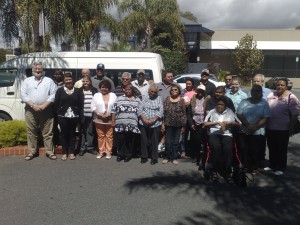The late Leslie Russell taught Peter Austin the Diyari language in 1974 when they met in Maree in northern South Australia. Leslie was a retired cattle station worker and was well known as a singer and teller of stories. He had a very clear voice and the right level of patience to help a beginner, Peter, learn his language (Leslie also spoke Wangkangurru from the north side of Lake Eyre). Sadly, he passed away in 1975.
One of the first sentences Leslie taught Peter was the following:
Yini waparna warayi warrithandru, nhingkirda ngaralha diyari
It means: ‘You came from far away to hear Dieri here’.
Listen to Leslie speaking:
Here are what the words mean:
yini means ‘you’ speaking to one person (remember that Dieri has three ways to say ‘you’ depending on how many people are being spoken to)
waparna means ‘go, move’
warayi means ‘did recently’ and indicates an action that occurred in the last 24 hours or so
warrithandru consists of warritha which means ‘far, distant’ and the ending -ndru which means ‘from’, so warrithandru means ‘from far away’
nhingkirda consists of nhingki which means ‘here’ and the ending -rda which means ‘close to the speaker’, so nhingkirda means ‘hear near me’. For a place a little further away you can say nhingkiya and further away still is nhingkiwa
ngaralha consists of ngara which means ‘to hear, to listen’ and the ending -lha which means ‘in order to …’ when an action is performed by the same person who performs the first action. Here, we have ‘you came from far away in order (for you) to hear Diyari’. We don’t have to mention the second ‘you’ because -lha tells us it is the same person doing both actions of coming and hearing
diyari is the name of the Diyari language
Why not try using this sentence yourself when you meet someone who is interested in learning to speak Diyari?
Note: The title of this blog post means ‘Listen to Diyari language’ — ngaramayi is made up of ngara ‘to hear, to listen’ and the ending -mayi which indicates a command (‘you do it!’).
You can hear a podcast of this blog post, including Leslie’s voice, here.





